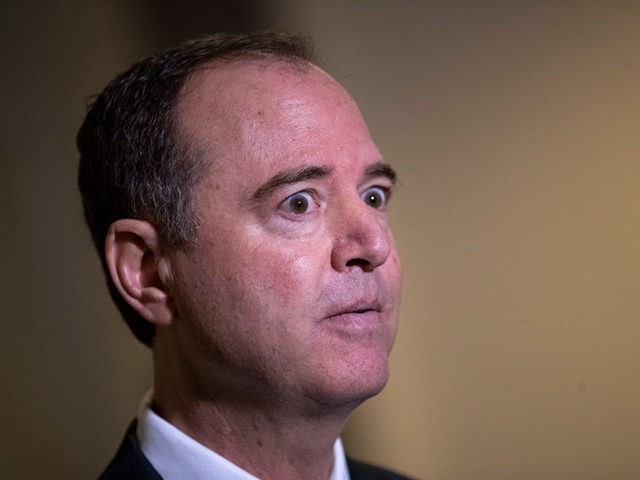Rep. Adam Schiff (D-CA) engaged in a failed attempt to direct Michael McKinley, a former top U.S. State Department official, on what to say during his impeachment inquiry deposition behind closed doors last month, according to transcripts released on Monday.
It appears that Schiff wanted McKinley to say that politics drove Secretary of State Mike Pompeo, at the behest of President Donald Trump, to remove former Ukraine Ambassador Marie Yovanovitch from her post. Schiff insinuated that Pompeo had removed Yovanovitch to hide wrongdoing in Ukraine at the hands of the Trump administration.
The California Democrat attempted to get McKinley to confirm his innuendo. Such a confirmation would have fueled the Democrats’ impeachment agenda.
Throughout his testimony, McKinley made it clear that he had no direct knowledge of the Ukraine matter that triggered the impeachment probe. He also stressed that he never discussed political issues with Pompeo.
Republicans have accused Schiff, the leader of the impeachment inquiry, of “coaching” witnesses while taking depositions.
House impeachment investigators are trying to determine if Trump abused his power by allegedly pressuring his Ukrainian counterpart, Volodymyr Zelensky, to investigate corruption allegations against Joe Biden and his son Hunter in exchange for aid during a July 25 call. Trump and Zelensky have denied the accusation.
McKinley accused Schiff of mischaracterizing his comments about a conversation he had with Pompeo over his concerns about the lack of support for Yovanovitch after he learned that Trump told Zelensky she was “bad news” during the call.
The top State Department official, who served as a senior adviser to Pompeo until he resigned on October 11, did not learn about the contents of the call until the White House released the transcript on September 24.
McKinley accused Schiff of trying to put words in his mouth while testifying on October 16.
Although McKinley had already explained that he did not receive a direct response from Pompeo when he suggested that the State Department should release a statement in support of Yovanovitch, Schiff continued to pressure him to say what he wanted to hear.
The exchange between McKinley and Schiff is described in the transcript as follows:
Schiff: Can you go back and, as best you can, tell us exactly what you told the Secretary?
McKinley: I said, are you aware of I’m sure you’re following what is happening. Wouldn’t it be good if we put out a statement on Ambassador Yovanovitch?
Schiff: When you said, I’m sure you’re aware of what’s happening.
McKinley: That’s right. Of course he said, yeah. You know, it’s that kind of exchange. I mean, to formalize it as something more.
Schiff: No, no. I’m just I’m not trying to formalize it. I’m just trying to get exactly what was said during the meeting.
McKinley sought a statement from the State Department in support of Yovanovitch after she was removed her from her post in Ukraine.
During her deposition, Yovanovitch explained that Trump pressured the State Department to remove her because he had “lost confidence” in her, adding that she was told by a superior that she “had done nothing wrong.”
The president has the right to remove any of his ambassadors, McKinley acknowledged.
On October 11, McKinley resigned from his post at the State Department over the lack of support for Yovanovitch and concerns about the “whistleblower’s” claim that Trump had politicized aid to Ukraine.
The “whistleblower’s” allegations are at the heart of the impeachment inquiry.
McKinley wanted the State Department to put out a statement saying “clearly that we respect the professionalism, the tenure of Ambassador Yovanovitch in the Ukraine.”
He ultimately dropped his quest for the statement after he learned from Morgan Ortagus, a State Department spokesperson, that Pompeo had decided “it was better not to release a statement at this time.”
McKinley testified that Ortagus explained that Pompeo did not want to release a statement “in part to protect Ambassador Yovanovitch [by] not draw[ing] undue attention to her.”
McKinley, however, testified that he subsequently talked to Yovanovitch, and she said she would welcome the statement.

COMMENTS
Please let us know if you're having issues with commenting.